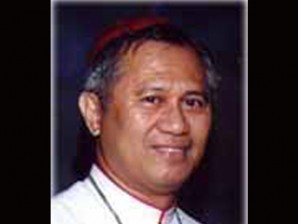The Catholic Bishops Conference of the Philippines (CBCP) opened its three-day semiannual plenary assembly at the Pope Pius XII Center on UN Avenue in Manila Saturday to tackle Church matters and pressing national concerns.
Some 100 bishops from various dioceses were expected at the gathering, where issues such as mining, the Mindanao peace process and the May elections would be discussed.
CBCP president and Cebu Archbishop Jose Palma earlier said the precinct count optical scan (PCOS) machines that would be used in the May elections would also be on the agenda.
In a previous interview with the Inquirer, Palma said the conference would discuss the voting machines because many people had reason to believe they had “a lot of defects.”
He had expressed the belief that the computerized voting machines successfully used in the 2010 elections were flawed and he wanted them thoroughly examined before they were used in this year’s elections.
“I, for one, can tell, or I will say I’m not ashamed to tell people that I also believe [the PCOS machine has defects]. It has to be examined and that is part of the agenda of the CBCP,” Palma said.
“Our point is the PCOS machines are not foolproof… there are technical glitches and anomalies that need to be addressed,” a source in the CBCP said. “We might feel too complacent because of the fast election results in 2010. But we’re after the accuracy and integrity of the election results.”
The source added that some resource persons, including from the Commission on Elections (Comelec) and Automated Election System (AES) Watch, are expected to speak at the CBCP meeting.
Former government chief peace negotiator and now Supreme Court Associate Justice Marvic Leonen was also invited to talk about the peace agreement with the Moros, the source said.
The assembly was preceded by a two-day seminar on Spirituality of Stewardship.
In a message to the CBCP, Pope Benedict XVI imparted his “apostolic blessing” to the bishops and said that he trusted that their meeting “will bear fruit.”
He also prayed for the activities planned for the start of the nine-year period in preparation for the fifth centenary celebration of Christianity in the Philippines.
The pontiff’s message was relayed by Vatican Secretary of State Cardinal Tarcisio Bertone through the Papal Nuncio Archbishop Giuseppe Pinto who graced yesterday’s opening of the plenary assembly.
The CBCP traditionally issues pastoral statements after the plenary assembly.
Benedictine awardee
During a Mass at the start of the assembly, the CBCP conferred the Jorge Barlin Golden Cross Award posthumously on the late Fr. Anscar Chupungco, OSB. The award was received by Fr. Rafaelito Alaras, prior of the Abbey of Our Lady of Montserrat.
In an article posted on the CBCP website, Chupungco was cited for “his great contribution in the liturgical renewal of our country.”
The Jorge Barlin Golden Cross Award is the highest recognition given by the CBCP to an individual for exemplary service to the nation.
The Benedictine monk was the third recipient of the award named after the first Filipino bishop. Other awardees have been lawyer Sabino Padilla Jr. and the late Fr. James Reuter, SJ.
Padilla is the legal counsel of the CBCP, while Reuter served as executive secretary of the Episcopal Commission on Social Communications and Mass Media.
Chupungco, a prominent liturgist, influenced the Church in the Philippines with regard to liturgical reforms. He was also executive secretary of the CBCP’s Liturgy Commission for several years.
During his funeral on Jan. 17, the priest was also conferred the papal honor Pro Ecclesia et Pontifice for his service to the Church.


